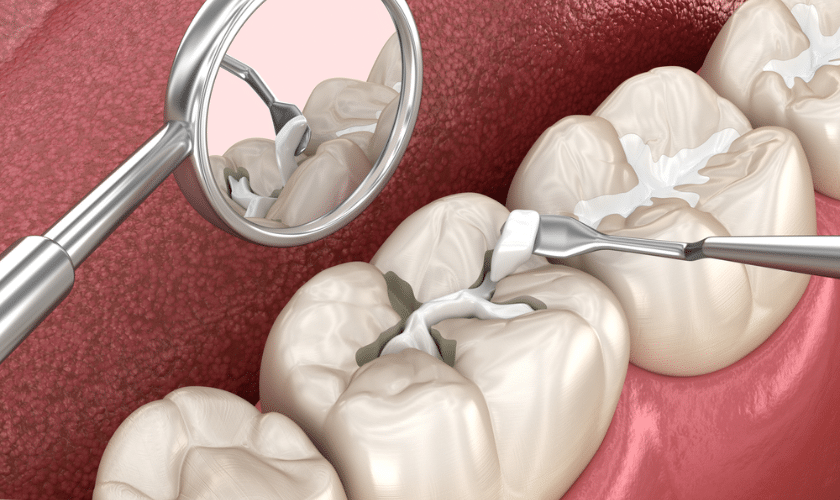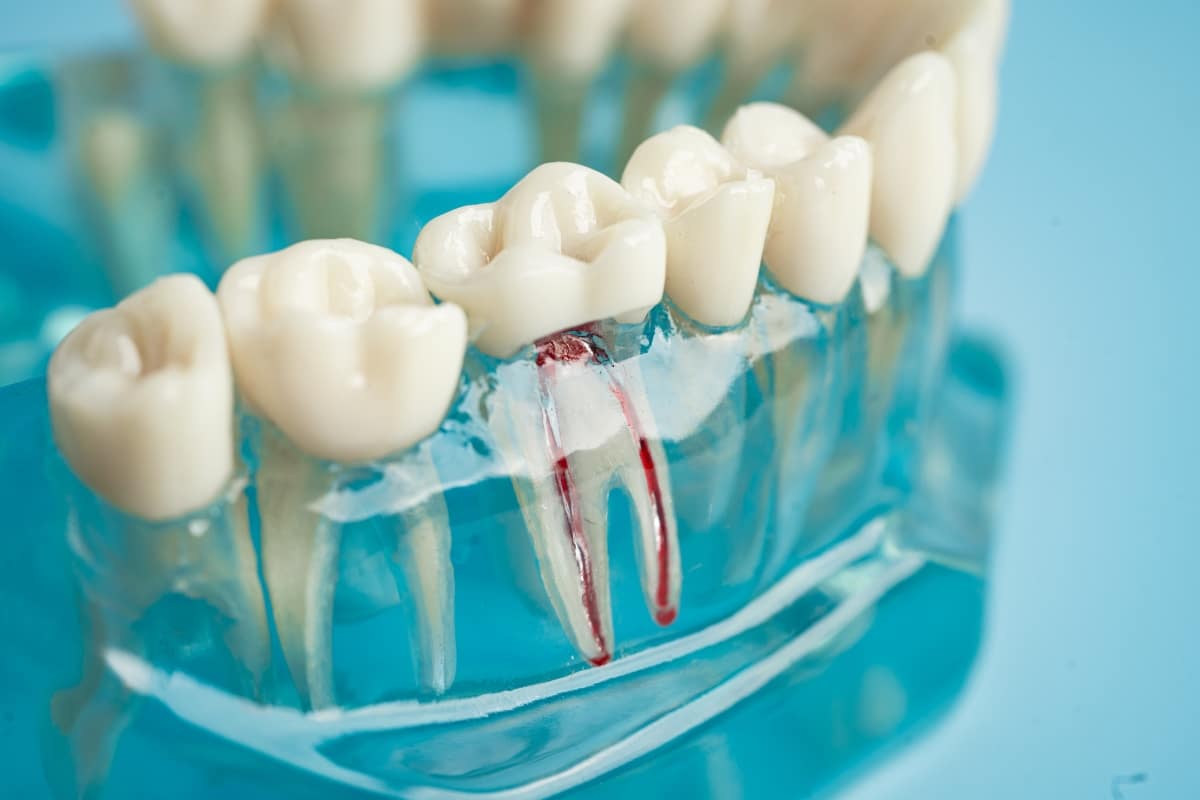Same-day treatments are available.
Are Dental Fillings Good For Your Teeth?

Are Dental Fillings Good? Yes! Dental fillings are a crucial tool in combating tooth decay, a common problem affecting many people around the world. This gradual process involves bacteria feasting on sugar in your mouth, creating acid that eats away at your tooth enamel. If left untreated, these areas can become cavities, which are small holes in your teeth. Thankfully, dental fillings provide a safe and effective solution to fix these damaged teeth and stop further decay from happening.
This blog dives deep into the world of dental fillings, exploring their benefits, materials used, the filling procedure itself, aftercare tips, and answers to frequently asked questions. By the end, you’ll have a comprehensive understanding of are dental fillings good for your teeth and be empowered to make informed decisions about your oral health.
Why Are Dental Fillings Important?
Dental fillings play a crucial role in preserving your oral health. Here’s how they benefit your teeth:
Stops Decay:
The primary function of a filling is to halt the progression of decay. By removing the decayed portion of the tooth and filling the cavity, fillings prevent bacteria from reaching deeper tooth layers and causing further damage.
Preserves Tooth Structure:
Are dental fillings good** at saving tooth structure? Absolutely! Fillings prevent the cavity from expanding and weakening the tooth, ultimately saving as much natural tooth structure as possible.
Reduces Pain and Sensitivity:
Cavities can cause discomfort, especially when exposed to hot or cold foods and beverages. Fillings eliminate this sensitivity by sealing the cavity and restoring the tooth’s integrity.
Improves Chewing Function:
Cavities can compromise your ability to chew effectively. Fillings restore the tooth’s shape and function, allowing you to chew comfortably without pain.
Enhances Aesthetics:
Depending on the filling material, fillings can improve the appearance of your teeth, especially for front teeth where aesthetics are a concern.
Types of Dental Fillings
Several types of dental filling materials are available, each with its advantages and disadvantages. Here’s a breakdown of the most common ones:
Amalgam (Silver Fillings):
These are the traditional fillings, known for their durability and affordability. They last for over 10 years and are suitable for back teeth that experience significant chewing pressure. However, their dark color may be aesthetically unappealing for some.
Composite Resin Fillings:
Are dental fillings good for aesthetics? Composite fillings are the answer! Made from tooth-colored resin, they blend seamlessly with your natural teeth, making them ideal for front teeth or areas where aesthetics are a priority. While not quite as durable as amalgam fillings, they can last for several years with proper care.
Glass Ionomer Fillings:
These fillings release fluoride, which helps strengthen the surrounding tooth structure and prevent further decay. They are often used for smaller cavities or children’s teeth. However, they may not be as strong as other filling materials.
Gold Fillings:
Are dental fillings good if you want something luxurious? Well, not exactly common nowadays, but gold fillings offer exceptional durability and can last a lifetime. However, their high cost and noticeable gold color make them a less popular choice.
The best type of filling for you will depend on the location and size of the cavity, your preference for aesthetics, and your budget. Discuss these factors with your dentist in Cypress to determine the most suitable option for your needs.
The Dental Filling Procedure
The dental filling procedure is generally straightforward and well-tolerated. Here’s a typical step-by-step breakdown:
Consultation and Examination:
Your dentist will first discuss your concerns and examine your teeth to assess the cavity’s size and location. They will also take X-rays to determine the cavity’s depth and ensure no underlying issues exist.
Anesthesia:
Depending on the extent of the cavity and your comfort level, your dentist may administer local anesthesia to numb the area around the tooth.
Numbing the Tooth:
An anesthetic injection will be given near the tooth to numb the area.
Cavity Removal:
The dentist will use a drill or laser to remove the decayed tooth material. This process may cause some minor discomfort, but the anesthesia will minimize any pain.
Cleaning the Area:
Once the decay is removed, your dentist thoroughly cleans the area to remove any remaining bacteria.
Placing the Filling:
The chosen filling material will be placed into the cavity and shaped to restore the tooth’s original form and function. For composite fillings, a curing light will be used to harden the resin.
Polishing the Filling:
The dentist will polish the filling to create a smooth surface and ensure proper bite function.
Bite Check:
Your dentist will check your bite to ensure the filling doesn’t interfere with your chewing. They may make minor adjustments if necessary.
Aftercare Tips for Dental Fillings
Following proper aftercare instructions is crucial for ensuring the longevity and success of your dental fillings. Here are some key tips to remember:
Maintain good oral hygiene:
Brush your teeth twice daily with fluoride toothpaste and floss once a day to remove plaque and food debris that can contribute to decay around the filling.
Avoid certain foods:
Are dental fillings good** enough to withstand all foods? Not quite. Steer clear of hard, chewy, or sticky candies that can dislodge the filling.
Be cautious with hot and cold:
Although fillings restore tooth sensitivity, it’s wise to avoid extreme temperatures initially, as new fillings might exhibit temporary sensitivity.
Schedule regular dental checkups:
Visit your dentist in Cypress for regular checkups and cleanings to monitor the fillings and overall oral health. They can identify any potential problems early on and take necessary steps.
Frequently Asked Questions About Dental Fillings
With local anesthesia, you shouldn’t experience significant pain during the filling placement. You might feel pressure or discomfort, but your dentist will ensure your comfort throughout the procedure.
The lifespan of a filling depends on the material used, the location and size of the cavity, and your oral hygiene habits. Amalgam fillings can last for over 10 years, while composite fillings typically last for 5-7 years.
If a filling falls out, contact your dentist immediately. They can assess the situation and determine the best course of action, which might involve replacing the filling or performing a more extensive treatment depending on the extent of damage.
Absolutely! Practicing good oral hygiene is the cornerstone of cavity prevention. Brushing twice daily with fluoride toothpaste, flossing once a day, and maintaining a healthy diet low in sugar are crucial steps. Regular dental checkups and cleanings allow your dentist to identify and address any potential problems early on before they necessitate fillings.
For very small cavities, your dentist might recommend fluoride treatments to strengthen the tooth enamel and prevent further decay. However, fillings are the most common and effective solution for restoring moderately sized or larger cavities.
Dental fillings are a safe and effective way to restore damaged teeth, prevent further decay, and maintain your oral health. They offer numerous benefits, including pain relief, improved chewing function, and preserving tooth structure. With proper care and regular dental visits, fillings can last for many years, allowing you to maintain a healthy and beautiful smile.
If you have any concerns about cavities or are dental fillings good for your specific situation, schedule an appointment with your dentist in Cypress. They can assess your oral health needs and recommend the most suitable treatment option for you.

7 Foods and Drinks to Avoid After Professional Teeth Whitening in Cypress

What to Expect After a Root Canal Treatment in Cypress



